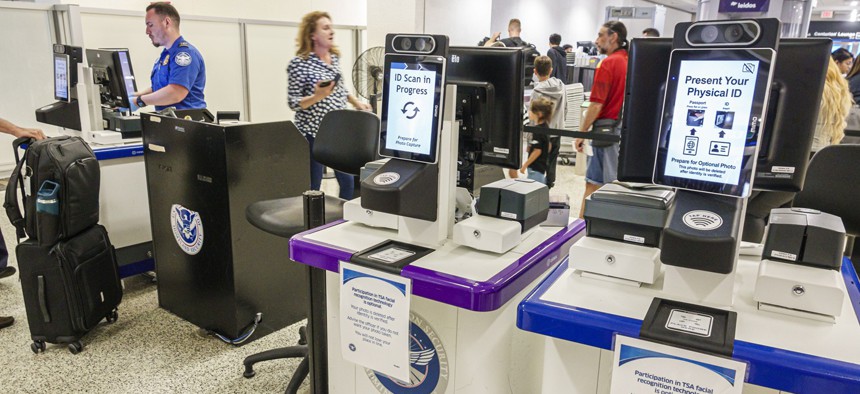Lawmakers call for a review of TSA’s biometric and AI use

ID scanners at a TSA checkpoint at Miami International Airport. Some lawmakers are seeking investigation into the security and cost effectiveness of such biometric devices. Jeffrey Greenberg/Universal Images Group via Getty Images
Members of the House Homeland Security Committee are asking GAO to investigate the benefits and potential harms of TSA’s usage of artificial intelligence and biometrics.
GOP leaders of the House Homeland Security Committee are asking the Government Accountability Office to conduct a “comprehensive review” of the Transportation Security Administration’s implementation of artificial intelligence and biometric technology solutions to ensure that they are not infringing on civil liberties while still improving security measures.
“As TSA continues to adopt biometric identification technologies and leverage artificial intelligence (AI) to enhance screening procedures, it is imperative that Congress evaluates the cost-effectiveness, operational impact, and privacy implications of these advanced tools,” a Jan. 8 letter sent to GAO Comptroller Gene Dodaro and shared with Nextgov/FCW reads.
Reps. Mark Green, R-Tenn., and Carlos Giménez, R-Fla., sent the letter with the goal of ensuring that the deployment of these technologies has a proper return on investment while adhering to existing federal data protections.
The lawmakers are seeking information on overall cost-benefit analyses amid AI deployment; impacts to operational efficiency; TSA’s existing privacy and data protection measures; TSA’s use of biometrics compared to other agencies; and projected long-term costs and benefits of AI and biometric tech expansion at TSA checkpoints.
The TSA has long worked on employing AI and biometric technology to operationalize and enhance security measures at U.S. transportation hubs and checkpoints. The protections around the personal data used in these technologies have frequently come under fire from cautious experts and lawmakers, who have questioned TSA’s use of Americans’ personally identifiable information.
In January 2024, the National Academies of Sciences issued a report calling for increased federal action to prevent the sensitive U.S. citizen data that is harvested at these checkpoints from being leaked.
In late 2024, TSA’s Chief Technology, Data and Artificial Intelligence Officer Matt Gilkeson spoke with Nextgov/FCW about the future of AI in the agency, focusing on talent acquisition and generative AI deployment while keeping safety in mind.
“We're focused and honing in on responsible use,” Gilkeson said. “TSA, from day one of our creation with any technology we deploy, has always looked at the technology from a lens of function, safety, security, equity and accessibility. We're looking across our existing policies and authorities to make sure that when we do execute a test event, we are accounting for any additional kind of responsible use principles that we need to make sure are there.”
Per TSA, participating in testing of biometric technology is voluntary, and travelers can opt out.






